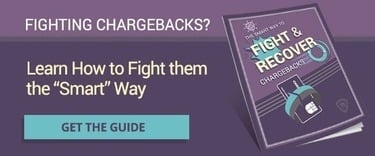Chargeback Pre-arbitration & Arbitration Explanation
Table of Contents
- What Does the Chargeback Process Look Like?
- What Is Chargeback Pre-arbitration?
- What Is Chargeback Arbitration?
- With Chargebacks, Prevention Is the Best Medicine
- What Is a Pre-arbitration Chargeback?
- How Long Does it Take for a Chargeback to Be Reversed?
- Why Do Merchants Avoid Arbitration?
Chargeback representment is a challenge many merchants hesitate to take on, but the rewards for doing so are well worth it. Every time you fight a chargeback, you learn valuable information that can be used to prevent future ones. And every time you get a chargeback reversed, you put money back in your pocket. Unfortunately, that's not always the end of the story.
In some cases, you might win in representment and mark that dispute in the victory column, only to later be notified that the bank is going to take those funds back a second time. When this happens, you've entered a new phase of the chargeback process: pre-arbitration. Let's go over what chargeback pre-arbitration and arbitration are and what you need to know about them to navigate the process successfully.
What Does the Chargeback Process Look Like?
The chargeback process begins when a cardholder contacts their bank to dispute a charge and the bank agrees to file a chargeback. Once the merchant receives notice of the chargeback, they have a decision to make. They can either accept the chargeback and take the loss or fight the chargeback through representment.

In representment, the merchant gathers evidence that demonstrates that whatever reason the cardholder gave for the chargeback is untrue.
For example, a merchant would respond to a chargeback with a "transaction not authorized" reason code with proof that the cardholder authorized the transaction.
The merchant submits this evidence to the issuing bank, which makes a decision to either uphold or reverse the chargeback.
However, if the cardholder disputes the transaction a second time based on new evidence, the issuing bank can pursue that as a second chargeback. At this point, the process enters pre-arbitration, or pre-arb, as a second round of disputes.
What Is Chargeback Pre-arbitration?
 Pre-arbitration is usually requested by the customer’s issuing bank, though the acquiring bank can also request it should the merchant be unhappy with the results of the initial dispute.
Pre-arbitration is usually requested by the customer’s issuing bank, though the acquiring bank can also request it should the merchant be unhappy with the results of the initial dispute.
When pre-arbitration is initiated, merchants have two options. First, they can accept liability for the chargeback, and the customer gets refunded their money in full. If they're not willing to accept liability, they can request arbitration. This means that the card network will step in to make a final decision on the dispute.
What Is Chargeback Arbitration?
Since the issuing and acquiring banks have been unable to settle on an outcome on their own, arbitration gives the card network the power to weigh in and have the final say.
Though arbitration can be beneficial to merchants if they come out triumphant, it’s important to note that it comes with significant fees for the losing party.
Fees vary by network, but for arbitration on a Mastercard chargeback, for example, whichever party loses the case will have to pay $500 in fees. This means it's usually only correct for a merchant to file for arbitration if the chargeback is very high value and the merchant is relatively certain the case will be decided in their favor.
Unfortunately, it's actually fairly difficult for a merchant to win a case in arbitration. The merchant has usually included all the evidence they have to support their case in representment, so if the cardholder presents new evidence that convinces the bank to overturn their decision, the merchant typically doesn't have anything left to counter with.
With Chargebacks, Prevention Is the Best Medicine
Arbitration is a risky and potentially very costly endeavor, so for merchants, preventing chargebacks is always the best option.
 Even if you're issuing a refund to prevent a chargeback, you're still saving yourself from chargeback fees and from an increase to your chargeback ratio. While every merchant is different, it's usually correct to prevent chargebacks where you can so that you can be more selective about which ones to fight.
Even if you're issuing a refund to prevent a chargeback, you're still saving yourself from chargeback fees and from an increase to your chargeback ratio. While every merchant is different, it's usually correct to prevent chargebacks where you can so that you can be more selective about which ones to fight.
FAQ
What Is a Pre-arbitration Chargeback?
How Long Does it Take for a Chargeback to Be Reversed?
Why Do Merchants Avoid Arbitration?
Thanks for following the Chargeback Gurus blog. Feel free to submit topic suggestions, questions or requests for advice to: win@chargebackgurus.com



